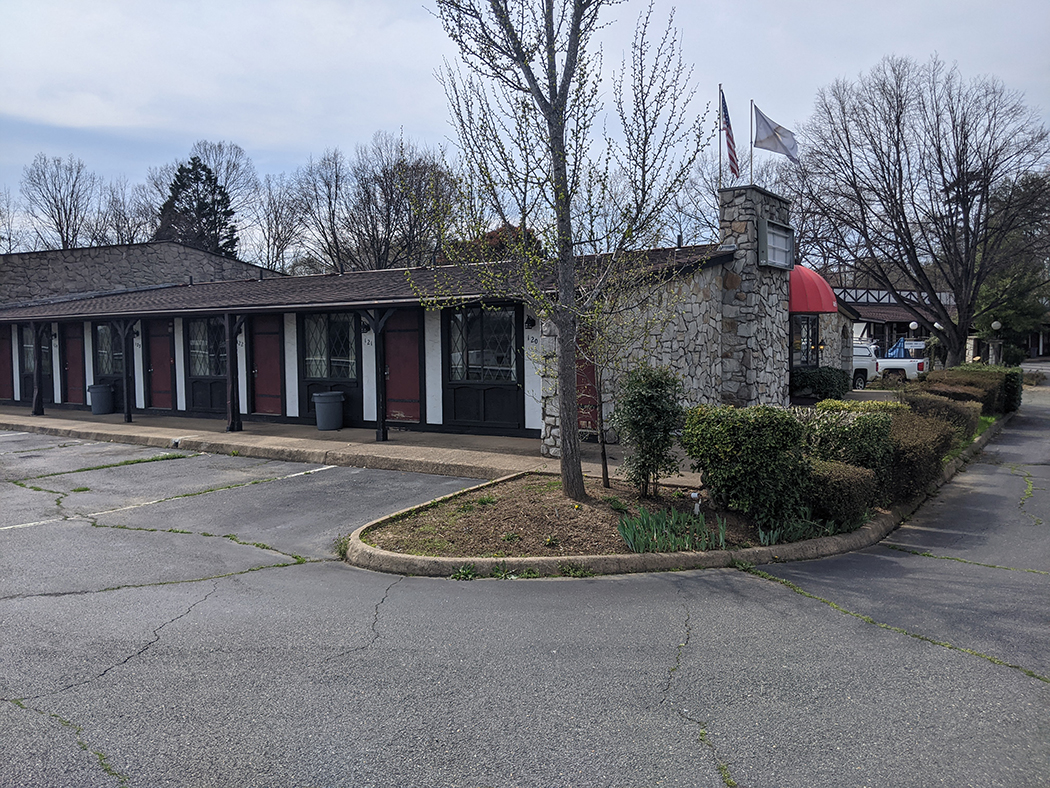Since the start of the coronavirus pandemic, local shelters have drastically expanded their efforts to house our most vulnerable community members. With support from the Thomas Jefferson Area Coalition for the Homeless and People and Congregations Engaged in Ministry, those experiencing homelessness have been able to stay at hotels, where they receive daily meals, case management services, and assistance with transition into permanent housing.
Putting people up in hotels isn’t cheap, however.
“The pandemic continued far, far, far longer than people anticipated, so you had a situation where there was a possibility of spending millions a year to keep people in these hotel rooms—but no real long-term solution for their homelessness,” says Eboni Bugg, director of programs for the Charlottesville Area Community Foundation.
After forming a partnership with TJACH last spring, the philanthropy facilitators at CACF began to look for permanent housing options around Charlottesville. When the Red Carpet Inn off Route 29 in Albemarle County was put up for sale over the summer, CACF saw the spot’s potential.
CACF gave the Piedmont Housing Alliance a $4.25 million grant to purchase the property and transform it into a non-congregate emergency shelter for people experiencing homelessness. Once it’s been renovated, PACEM and TJACH will manage the 115 single-occupancy rooms.
The shelter “will be similar to the kind of support people have been getting in emergency shelter programs with PACEM,” says TJACH Executive Director Anthony Haro. “We’re making sure that it’s a safe and healthy environment for everybody, and that there’s support to get basic needs met, [like] food and clothing. [We’ll] also provide connections to more unique services in the community—employment services, mental health services, substance abuse treatment, and medical care.”
The former hotel will help alleviate the desperate need for affordable housing in the Charlottesville area. Over the next five years, PHA plans to construct 60 additional affordable housing apartments on the property. They’ll be rented for no more than 30 percent of the gross income of future residents.
By 2023, Virginia Supportive Housing will also build 80 permanent housing units at the site. Those apartments will be available to disabled individuals who chronically struggle with homelessness, and a variety of services will be offered.
PACEM plans to move its guests staying at the local La Quinta Inn & Suites into the newly renovated hotel by the end of the month.
“We’re replacing the wallpaper and cleaning the walls. There’s mold underneath the wallpaper in the rooms—in some rooms it’s pretty extensive,” says Haro. “We’re also replacing the carpets.”
Those people were paying $1,200 to $1,400 a month for one of those hotel rooms—no one should have to do that.
Eboni Bugg, Charlottesville Area Community Foundation director of programs
The hotel wasn’t empty, however. A handful of long-term guests had been living there when the inn changed hands. The previous owner didn’t tell the tenants about the property sale, says Bugg.
“We did actually request well ahead of time the names of folks so we could do some outreach to ensure what happened didn’t happen. [But] when we went to check on the people to see if they had a plan, the owner had never notified anyone that the hotel was closing,” says Bugg. “[The owner] even had collected rent beyond the closing date.”
PHA was able to place the guests in a new hotel, and will allow those still in need of housing to move into the new shelter.
“The [new] development is actually aiming to solve problems like this,” Bugg says. “Those people were paying $1,200 to $1,400 a month for one of those hotel rooms—no one should have to do that.”
According to PACEM Executive Director Jayson Whitehead, demand for emergency housing has spiked over the course of the pandemic. Since last summer, the 60 rooms reserved for high-risk guests at the La Quinta have remained at full capacity.
During the winter, TJACH had to reserve additional rooms for high-risk guests at several other area hotels, while PACEM provided shelter at a handful of local churches for around 70 guests who weren’t medically vulnerable.
Over the past few months, UVA Health employees have visited the hotels and congregate shelters, as well as The Haven and Salvation Army shelter, to offer guests COVID vaccines.
“Surprisingly high numbers of our folks have taken advantage of that…considering all of the fears and conspiracy theories,” says Whitehead.
Once the new shelter is fully completed, people in need of emergency housing will be able to contact The Haven, complete the intake process, and receive transportation to the shelter. Guests will be within walking distance of a bus stop, as well as necessary amenities, like grocery stores and laundromats. They can also reserve rides with JAUNT.
A majority of PACEM’s guests are experiencing homelessness due to larger factors, like mental illness and addiction, says Whitehead. However, evictions remain a huge concern for local housing advocates. From January 1 to April 2, 15 eviction judgments (out 92 unlawful detainer hearings) were made in Charlottesville, and 15 (out of 66 hearings) were made in Albemarle County.
The end of the pandemic might be approaching, but the city’s problems with low-income housing won’t fix themselves any time soon.
“We will need support from the community to make this project a success financially,” says Haro.
